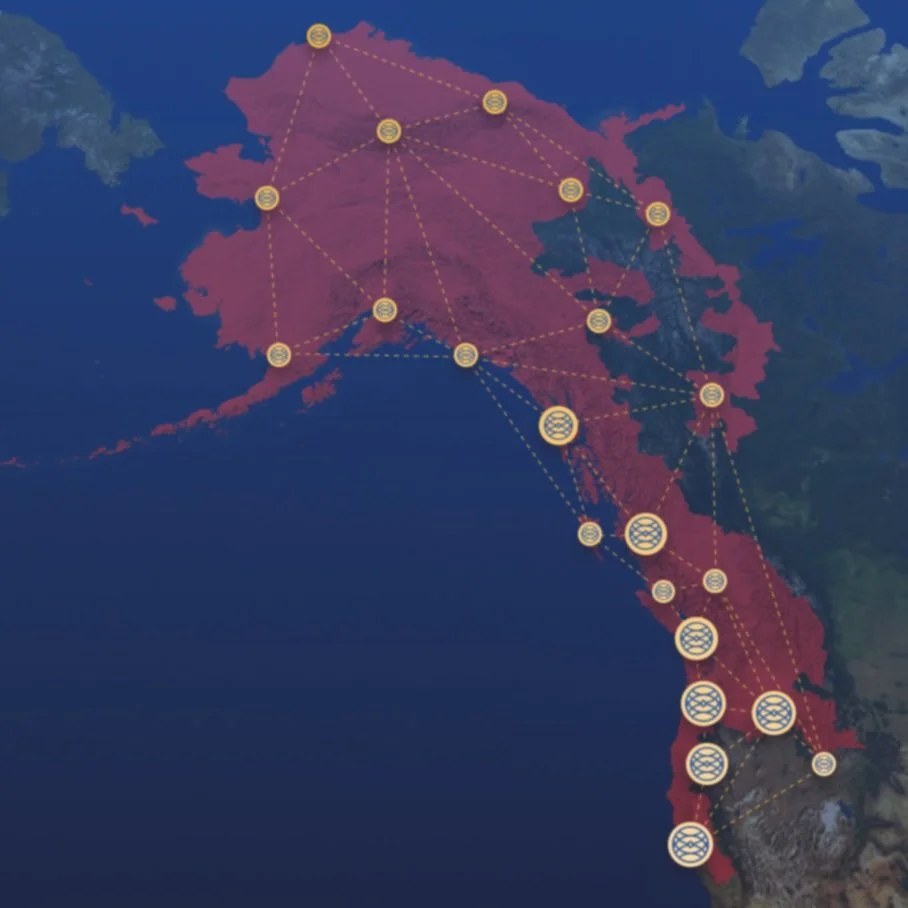SAGHALIE
[SAGH-a-lie] or occasionally [SAH'-ha-lie] — adjective.
Meaning: Up; above; high; heaven; sky; celestial; top; uppermost; over (above); upwards; lofty; holy.
Origin: Chinook, sakhali; Clatsop, ukhshakhali. Up; above; high.
Sometime rendered as ‘sagalie’, ‘sagalee’, ‘saqalie’, and even ‘sahhalie’ or ‘sahali’, this word was usually pronounced as if it were spelled ‘sockalie’ by Euro-Americans, while the indigenous pronunciation was closer to ‘sag-ha-lie , with the ‘g’ sound a guttural deep in the throat rather than an aspirate h.)
An adjective encompassing concepts of upwardness in direction and elevation, such as “elip saghalie” (upper; uppermost), ‘saghalie’ was used to describe the act of being on top of something, as seen in “mahsh ikta kopa saghalie” (cover) and “mitlite saghalie kopa chuck” (float), as well as describe ascension, like "mamook saghalie" (to lift; raise; elevate) and “klatawa saghalie” (to climb; ascend), as in "klatawa kopa saghalie la-montay" (to ascend to the summit of the mountain) or “saghalie kopa mountain" (on top of the mountain).
Word order and context is important in Chinook Wawa, since there is a difference between “saghalie kopa” (upon) and “kopa saghalie” (aloft; celestial).
The word also lent itself to physical features as well, such as “saghalie illahee” (mountains; highland; upland), “tenas saghalie Illahee” (hill), and even natural phenomenon, such as “saghalie chuck” (high tide), “skookum noise kopa saghalie” (thunder), and “saghillie piah” (lightning).
Zealous in their search for converts, early Christian missionaries quickly came to learn that there was no one universal deity among the FIrst Nations. For want of a native term, the evangelists instead coined “Saghalie Tyee“ (god; deity; creator) as a word of ‘Chief Above’ or ‘Great Spirit’, implying a ruler over all things.
This lead to several other neologisms, such as "Saghalie Tyee yaka book" (Bible; scripture) and "Saghalie Tyee yaka Illahee” (Heaven), as well as a number of concepts such as “saghalie tyee law” (commandments), “wawa kopa Saghalie Tyee” (to pray; prayer; worship), "potlatch kopa saghalie tyee" (dedicate; consecrate), “kloshe tumtum kopa Saghalie Tyee” (piety), “kahkwa Saghalie Tyee” (holy), “kahkwa Saghalie Tyee” (godly; godlike), “kloshe kopa Saghalie Tyee” (sacred), “wake kloshe kopa Saghalie Tyee” (profane), "Saghalie Tyee yaka wawa" (religion; sermon; gospel), and "mahsie kopa Saghalie Tyee" (praise to God; the Doxology). Even Jesus Christ was translated as "Saghalie Tyee Yaka tenas" ( God, His Son).
As a result of its use, “saghalie” also came to mean ‘sacred’ and ‘holy’, as seen in “saghalie illahee” (now taken to mean sacred or holy ground, a spirit-place, or a churchyard, but not a graveyard, which is “memaloose illahee”). There were even occasions where “saghalie” would refer to magic of the sacred or ‘pure’ kind, or be used to describe a spirit world or a spiritual state.







